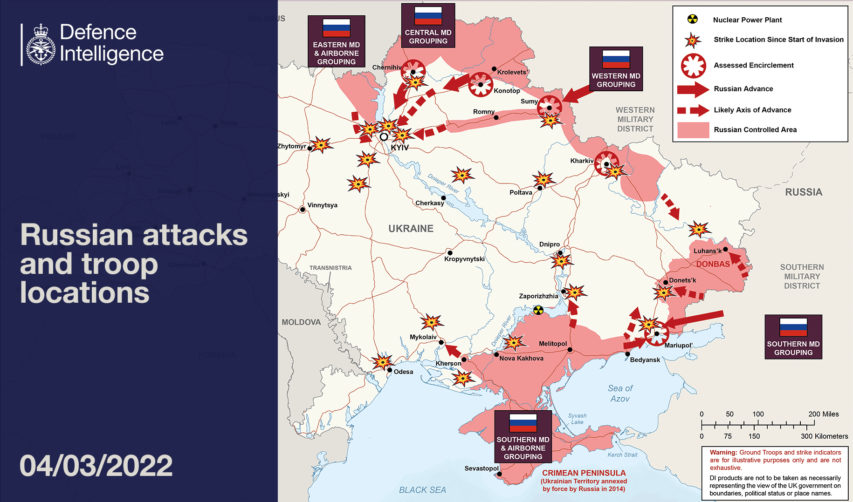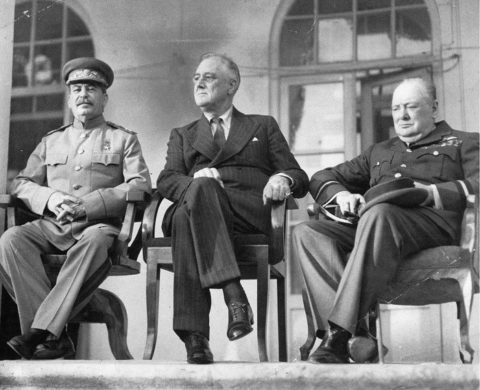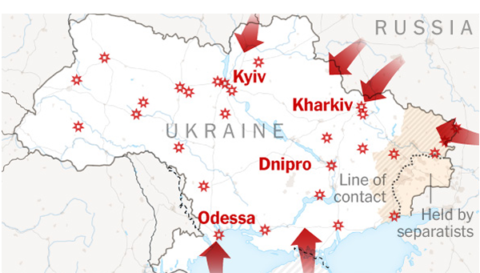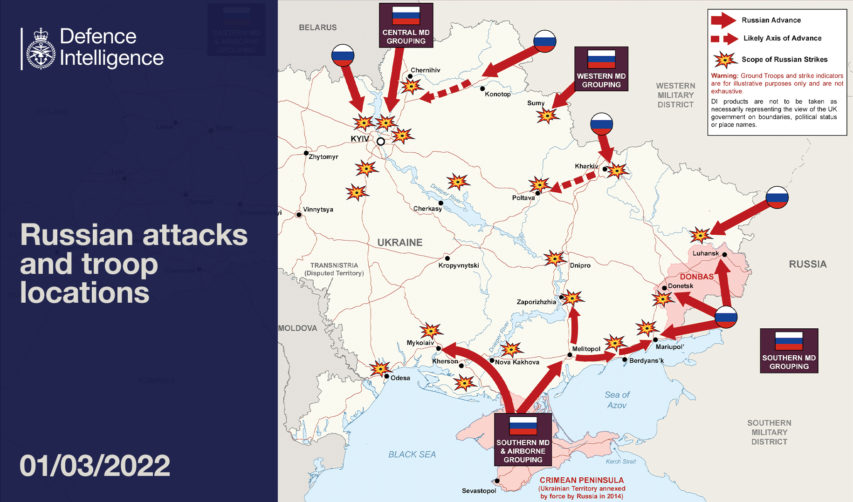In The Line‘s weekly round-up for freeloading cheapskates like me (we only get a diet version of the full post), Boris and Natasha explain why it’s all the fault of NATO and the west, and that Russia is completely innocent of any wrongdoing:
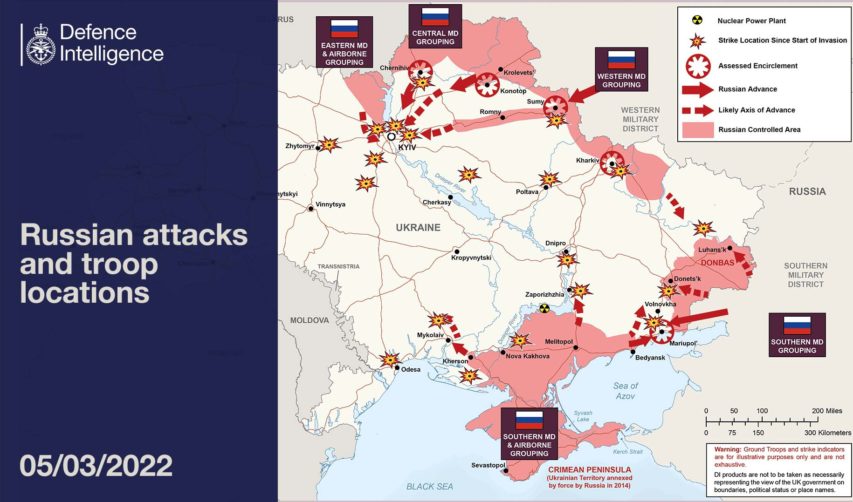
As the world continues to watch the horrors unfolding in Europe, we in our cozy Western enclaves are left to re-discover uncomfortable realities about the geopolitical circumstances around us. Namely, the world is not as safe as once we had thought, and America is not the only great power capable of inflicting atrocities on a smaller, sovereign nation for its own benefit. In fact, watching the situation in Europe play out, we’re reminded that America is not a uniquely evil entity at all — and that many of the moral errors it has committed were made precisely because the neighbourhoods in which it presumed to operate are neither peaceful, easy, nor kind.
These are old lessons of history and history — unlike ideology — is messy and complicated. And as we once again draw out those long-forgotten lessons, we find ourselves confronting old arguments as well.
Namely, we see a lot of thoughtful individuals offering the contrarian argument that NATO and the West are ultimately to blame for the invasion in Ukraine because of our military alliance’s expansion into Russia’s traditional sphere of influence. This undermined the old Russian empire’s dignity, the argument goes, and fomented Cold War paranoia that was bound to break out into an aggressive military response.
We at The Line expect this decades-old position will be debated for decades more to come, but in light of the events of the last week, we find it less compelling than ever. We offer the following three problems with this line of argument.
The first is that it falls into the trap of assuming that NATO — and, by implication, America — is the Main Character of global history.
In the minds of the NATO blamers, neither Russia’s domestic political intrigues, Vladimir Putin’s personal ideological commitments and sanity, nor the histories and cultures of the actual regions in question are given greater weight than NATO’s scheming or Joe Biden’s speaking skills. The solipsism and self-regard that this argument implies is, in truth, both stunning and entirely in keeping with the United States’ national character (and the West in a broader sense). By this metric, it’s America/the West, and only America/the West, that is the true global protagonist. The rest of humanity are just bit-players in a grand Western narrative.
As Canadians, we find these assumptions particularly offensive. Ours is a country that exists between America and Russia, and while we may disagree with specific American military engagements and tactics — and will say so! — we are not hapless serfs of American imperialism. Let’s lay out our choices plainly: a middle power like Canada can ally itself with Russia, China, NATO, or find some form of interdependence with a patchwork of one-on-one military alliances. Even if we were to take our economic interdependence with America out of the equation, NATO is our best option by far. We mean … Jesus. Duh.
We will pick NATO 999 times out of 1,000 and so will most free people living in democratic societies. Because the other options are clearly, obviously much, much worse: NATO is the certified preferred military alliance of the free peoples on this planet.
We welcome historical self-reflection and improvement, but America cannot allow itself to wallow so deeply in its own self-flagellating narcissism that it forgets this fact. America is not the Main Character of our shared history, but it is a leader within the global community, and must rise to that role and NATO with it.
In the Daily Sceptic, Noah Carl notes that “the West’s response [to the Russian invasion] seems to have been slapped together on the fly amidst a storm of social media outrage”:
The West has responded to Russia’s invasion of Ukraine in three main ways: pouring arms into Ukraine to buttress the country’s defence; imposing heavy sanctions on Russia to cripple its economy; and essentially “cancelling” Russia by shutting down its foreign media, censoring its cultural exports, and banning its athletes from international competitions.
The hope seems to be that either one of three things will happen: the Russians will be defeated or forced to withdraw; Putin will be overthrown in a palace coup or popular uprising; or he’ll be brought to the negotiating table and made to accept terms highly unfavourable to Russia. While this strategy may work, I’ve yet to read a cogent defence of it.
In fact, the strategy could have a number of negative second-order effects – i.e., unintended consequences – that haven’t been properly thought through.
As several people have observed, the West’s response seems to have been slapped together on the fly amidst a storm of social media outrage, as opposed to being carefully devised after consideration of all possible eventualities. One Substack commenter noted:
Just as COVID-19 is the first pandemic in the Age of Twitter, so the Ukraine invasion is, in some sense, the first war in the Age of Twitter. As it unfolds, we are seeing many disturbing parallels to the events of early 2020. People are rapidly normalising once-fringe ideas like a NATO-enforced no-fly zone, direct U.S. conflict with Russia, regime change in Moscow, and even, incredibly, the use of nuclear weapons. Just as with Covid, we’re seeing the rapid abandonment of longstanding Western policies. The overnight flips on German defence spending and SWIFT are like the overturning of conventional public health policies on masking, lockdowns, and so on.
Let’s deal with each aspect of the Western response in turn. Pouring arms into Ukraine may precipitate a Russian defeat. But it could just as easily prolong the conflict, leading to many more Ukrainian deaths. The Syrian civil war has dragged on for more than ten years and claimed more than 400,000 lives, in part thanks to external arming of rebel groups.
If there’s a good chance the Ukrainians can win, supplying them with arms makes sense. But if they’re unlikely to prevail, why would we want to prolong the conflict?
One possible answer is to deter the next autocratic ruler from launching a similar invasion. But how much deterrence does supplying arms really achieve, especially if Russia ends up winning? Now, entering the war on Ukraine’s side – that would achieve deterrence, but it’s something the West isn’t willing to do (for obvious reasons).
Brendan O’Neill is hoping that the conflict in Ukraine can also help end the “Age of Fragility” in the west:
It is not the most pressing question to emerge from Russia’s onslaught on Ukraine, but I have nonetheless found myself wondering – what will happen with the word “erasure” following this terrible war? Ukraine’s heroic president Volodymyr Zelensky used the e-word the other day. Russia, he said, is out to “erase our history”. The Putin regime and its marauding forces want to “erase our country, erase us all”, Zelensky cried, aptly, given the vigour and bigotry with which Vladimir Putin has mocked and violently undermined Ukrainian sovereignty. Putin clearly sees Ukraine as a joke nation that can be casually scrubbed from the map and collapsed back into Russia.
Zelensky’s impassioned, existential words got me thinking: which woke warrior here in the mercifully war-free West will dare to misuse the word “erasure” now? “Erasure” is a key buzzword in the PC lexicon. There’s trans erasure, LGBT erasure, the erasure of black women with “kinky hair”. Only erasure here doesn’t mean “the removal of all traces of something”. It certainly doesn’t mean a foreign power using brute force to extinguish your most basic rights. No, it means a gender-critical feminist turning up to your campus and saying “If you have a penis, you are a man”. It means EastEnders not having enough bisexual characters. It means being asked “Can I touch your hair?”. It means attending a museum or some other public institution and seeing that its Pride flag doesn’t include the shade that represents your femme-boy demisexual identity. All of this is very seriously described as “erasure”, as the “violent” exclusion of me and my identity. Even as bombs fall on Kharkiv and Kyiv, threatening to erase people and infrastructure, designed to erase a nation’s identity, still time-rich, experience-poor activists in the West seriously believe they are being erased by tweets and questions and opinions that differ from their own.
It remains to be seen which woke midwit will be the first to say out loud that having to walk past a statue of a long-dead Brit with iffy beliefs feels “erasing” at the same time as statues and buildings and people in Ukraine are being erased by Russian bombs. But what we know for sure, already, is that the war in Ukraine has raised burning questions not only about the Putin regime’s criminal behaviour and Ukraine’s right to self-determination, but also about us, about the West, about what we might say and do, if anything, in relation to this war in Europe. The war in Ukraine is an incredibly confronting moment for our continent. It reminds us that history is not in fact over, that unresolved questions of power and territory lurk just beneath the surface of politics, and that war is not the faraway phenomenon we thought it was. More fundamentally, it implicitly issues a challenge to the unseriousness, the smallness, of what passes for public life in 21st-century Western Europe. It asks us if we are ready for the violent return of history. The answer, right now, sadly, is No.
Over the past week, the contrast between the frivolousness of the woke West and the seriousness of threatened Ukraine, between the narcissistic obsessions of secure Westerners and the fight for survival being waged by youthful Ukrainians, could not have been more stark. On the very day Russia launched its invasion, the UK Ministry of Defence’s LGBT Network (why?) announced on Twitter that it was having a coffee morning to discuss pansexuality and asexuality. Yes, as Ukrainians hid from Russian tanks and planes, a part of the actual MoD was sipping lattes and chatting about folks who feel a “romantic, emotional and / or sexual attraction to people regardless of their gender”. Not to be outdone, the head of MI6, Richard Moore (he / him), used the occasion of Russia’s bombardment of Ukraine to issue a “series of tweets” on LGBTHM2022 – that’s LGBT History Month 2022 for those of you not abreast with the alphabet soup. “We want your help!”, Ukrainians cried. “Here’s some information about the vast spectrum of human sexual attraction”, the British security services replied.
As everyday Ukrainians pull together and arm themselves with guns and petrol bombs, the military top brass of Britain have rather different concerns. Such as why you should avoid using words like “manpower”, “strong” and “grip”. They “reinforce dominant cultural patterns”, according to a recent internal report authored by UK national security adviser Sir Stephen Lovegrove. Does that mean I’m not allowed to tell military bosses to get a grip? Apparently you should also check your white privilege and use gender-neutral language wherever possible. And let’s not forget the campaign for “vegan uniforms” in the British army. This week, as Ukraine burns, it was reported that the Ministry of Defence Vegan and Vegetarian Network (again, why?) is agitating for animal-friendly clothing and boots, excluding things like leather. Well, you wouldn’t want to be wearing the skin of a dead animal as you kill a human being, would you?



